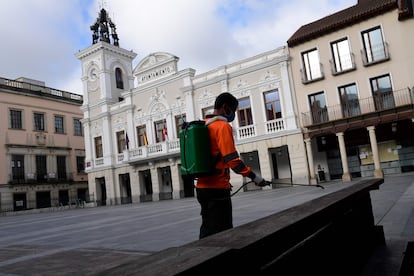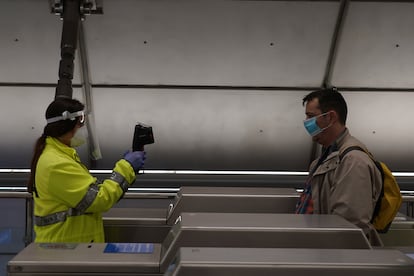Daily coronavirus-related deaths in Spain fall to 123, while new cases drop to 373
Health authorities say the decision several weeks ago to allow children outside for supervised walks has not yet led to a spike in infections

The number of daily coronanvirus-related deaths in Spain fell to 123 on Monday, according to the latest figures from the Spanish Health Ministry. This represents a fall from Sunday, when 143 fatalities were recorded. The total number of victims in Spain now stands at 26,744, a 0.54% rise on the day before. This is the lowest percentage increase since the peak of the outbreak in early April.
There was also a significant drop in the number of new infections confirmed via PCR tests. In the past 24 hours, 373 new cases were detected, compared to 621 on Sunday. According to the latest data, six regions reported fewer than 10 positive cases – Asturias, Balearic Islands, Canary Islands, Cantabria, Extremadura and Murcia.
According to the latest data, six regions reported fewer than 10 positive cases
At the other end of the spectrum, Castilla-La Mancha, Castilla y León, Catalonia and Madrid each reported more than 30 new infections. A total of 227,436 cases in Spain have been recorded since the beginning of the coronavirus outbreak, a 0.17% rise on the day before.
Speaking at the government’s daily press conference on Monday, Fernando Simón, the director of the Health Ministry’s Coordination Center for Health Alerts and Emergencies, said: “Today’s figures are truly very positive.”
The health official added that the decision to allow children to go outside for supervised walks has not yet had any negative impact on the outbreak in Spain. “We have not observed any substantial spike [in cases],” he said.
Today’s figures should be regarded with certain caution, given that since the coronavirus crisis began there has been underreporting of the data on Sundays and Mondays due to lower staffing levels at hospitals during the weekend.
Half of Spain moves to Phase 1
Around half of Spain’s population moved on Monday to Phase 1 of the government’s coronavirus deescalation plan. Under this stage, residents are able to visit loved ones, attend funerals, go shopping without a prior appointment and have a drink at a street café.
The Madrid region will reapply for Phase 1 of the coronavirus deescalation plan after its original request was rejected last week. The regional health chief, Enrique Ruiz Escudero, said on Monday that authorities are “working as we speak to apply again this week.”

As the confinement measures were eased, regional leaders called on citizens to act responsibly. In a message on Twitter, Francina Armengol, the premier of the Balearic Islands, said: “No one wants to go back [to the stricter lockdown measures] but we have to prove it every day. With commitment, solidarity and social discipline, thinking about one’s own safety and health, but also that of others.”
In Spain’s Basque Country, the regional government began taking the temperature of passengers on public transportation in the city of Bilbao in a bid to prevent coronavirus contagion.
Madrid’s request to move to Phase 1 was rejected by the central government on Friday, while only some parts of Castilla-La Mancha, Castilla y León and Catalonia – which all reported more than 30 new infections on Monday – were granted approval to scale down confinement measures. The regions of Valencia and Andalusia, with 26 and 16 new infections respectively on Monday, also only partially moved to Phase 1.
Enrique Ruiz Escudero, the head of Madrid’s regional health department, said on Monday that the regional government will ask “today” to move to Phase 1. In an interview with the radio station Onda Madrid, Ruiz Escudero said: “We are working to request [the transition to Phase 1] again this very week.”
Masks in Madrid
The regional government in Madrid began on Monday to distribute seven million FFP2 face masks for free in pharmacies. The move comes despite concerns raised by the heads of preventive medicine in the region’s hospitals, who say that such masks are not recommended for the entire population and may actually be counterproductive. The Spanish Association of Occupational Medicine (Aeemet) also warned the regional government that FFP2 masks are only recommended for health workers. In a press release, the association added that there continued to be a “shortage” of these masks in hospitals.

In a radio interview on Monday, the premier of Madrid, Isabel Díaz Ayuso, said that she was considering making the use of masks compulsory in closed spaces and when in contact with other people. “It’s no use for someone to follow all the confinement measures if then, while standing in line at the supermarket, someone behind them coughs and infects them,” she told Spanish radio station Onda Cero.
However, under the state of alarm, only the central government has the authority to implement such measures.
Andalusia to approve plan to reopen beaches
The regional government of Andalusia will approve on Monday a plan to reopen beaches in the southern region in the summer. The government has said it plans to reduce capacity on beaches by 40% or 50%, set up police controls to monitor access and social distancing measures, and to ban group games. “The goal is to be able to enjoy swimming with the utmost guarantees,” said regional premier, Juan Manuel Moreno, in a message on Twitter.
Spanish soccer league could resume matches in June
Spain’s top soccer league could resume the championship in mid-June. That’s according to Javier Tebas, the president of La Liga, who said that he would like games to begin on June 12, in an interview with Spain’s telecommunications and media giant Movistar.
“It depends on whether there is a new spike in cases or not, and that is not up to soccer, it is up to the Spanish people,” he said on Sunday. Tebas confirmed that, after carrying out 2,500 tests on players and members of the first and second division, eight people have tested positive for Covid-19, five of whom are soccer players. According to the La Liga president, the outcome was better than expected. “We were expecting around 25 or 30 [coronavirus cases] for statistical reasons, we had estimated that the incidence of the coronavirus would give us that amount.”
Madrid police break up house parties
This weekend, local police in Madrid broke up 400 house parties, after receiving complaints from neighbors, and located 97 small outdoor drinking sessions (known in Spanish as a botellón), according to municipal sources. Three people were arrested on Saturday, and another nine on Sunday.
Mental health risk
The mental health of 46% of Spaniards is at risk due to the coronavirus crisis, according to an international study led by Open Evidence, from the Open University of Catalonia (UOC). The study, which is based on interviews with 10,551 people in Spain, Italy and the United Kingdom, found that six in 10 Spaniards experienced moments of sadness, depression or desperation when thinking about the future during the pandemic.
English version by Melissa Kitson.
Tu suscripción se está usando en otro dispositivo
¿Quieres añadir otro usuario a tu suscripción?
Si continúas leyendo en este dispositivo, no se podrá leer en el otro.
FlechaTu suscripción se está usando en otro dispositivo y solo puedes acceder a EL PAÍS desde un dispositivo a la vez.
Si quieres compartir tu cuenta, cambia tu suscripción a la modalidad Premium, así podrás añadir otro usuario. Cada uno accederá con su propia cuenta de email, lo que os permitirá personalizar vuestra experiencia en EL PAÍS.
¿Tienes una suscripción de empresa? Accede aquí para contratar más cuentas.
En el caso de no saber quién está usando tu cuenta, te recomendamos cambiar tu contraseña aquí.
Si decides continuar compartiendo tu cuenta, este mensaje se mostrará en tu dispositivo y en el de la otra persona que está usando tu cuenta de forma indefinida, afectando a tu experiencia de lectura. Puedes consultar aquí los términos y condiciones de la suscripción digital.








































